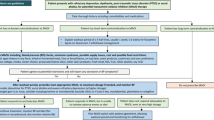Summary
This review discusses the adverse effects of 3 categories of antidepressant drugs; the monoamine oxidase inhibitors (MAOIs), the tricyclic compounds (in part 1 of the review) and the newer (‘second generation ’) drugs which differ structurally and pharmacologically from previous antidepressants as well as from each other (in part 2 of the review appearing in the next issue of the journal).
The MAOIs interact with a wide variety of amine-containing foods and interfere with the metabolism of many proprietary and prescribed medications. They also have effects on several organ systems including the cardiovascular system (hypotension), the CNS and the liver, as well as producing hypoglycaemia and impaired sexual function.
22 different tricyclic compounds have been studied worldwide, with few significant differences among them despite extensive molecular modification. As a class the most important potential interacting substances with tricylics include MAOIs, alcohol, anticholinergics and phenothiazines (especially if anti-Parkinsonian drugs are also given).
In the second part of the review each of the ‘second generation’ compounds is discussed, including viloxazine, maprotiline, mianserin, nomifensine, trazodone, zimelidine and L-tryptophan. Claims for therapeutic advantages or freedom from adverse effects over the tricyclic compounds with these newer agents are yet to be clearly proved or disproved, but less serious toxicity on overdose appears to be an important advantage with some of these newer agents.
Rational decision making in selecting from among the antidepressant drugs available should be based on an understanding of the properties of the 3 drug groups available, as well as properties of individual drugs within each group. The practitioner should carefully consider the criteria for selection of a specific drug, the appropriate dose, regimen, and duration of treatment as well as factors to be discussed with the patient. For most uncomplicated cases of depression the tricyclic antidepressants remain the drugs of first choice; in selected instances the newer compounds are preferred while the MAOIs remain drugs of final choice if other treatments fail
Similar content being viewed by others
Author information
Authors and Affiliations
Rights and permissions
About this article
Cite this article
Blackwell, B. Adverse Effects of Antidepressant Drugs. Drugs 21, 201–219 (1981). https://doi.org/10.2165/00003495-198121030-00002
Published:
Issue Date:
DOI: https://doi.org/10.2165/00003495-198121030-00002




